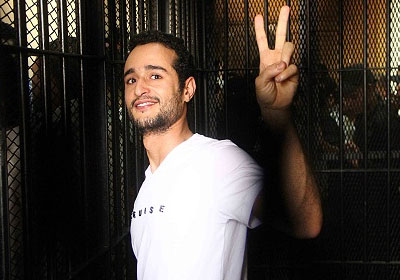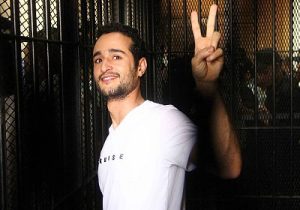Hours before Ahmed Douma’s appeal hearing is scheduled to be heard on April 27th at the Egyptian Court of Cassation, the undersigned political parties and organizations reaffirm their rejection of the unjust life sentence issued against him in connection with the 2011 Cabinet clashes. Douma, the founder of the April 6th movement and a prominent pro-democracy activist, has spent over three years in solitary confinement for exercising his right to assembly after an unjust trial marred by a litany of egregious violations. Members of the military and security forces were not prosecuted for deploying lethal force to disperse what began as a peaceful sit-in outside the Cabinet offices, leaving 17 demonstrators dead and during which military personnel openly brutalized and stripped female demonstrators of their clothing.
Douma’s trial was sullied from the beginning by flagrant infringements upon due process. The investigating judge leveled four charges against Douma in January 12, 2012 and then he was referred to trial on July 29th of that same year on the basis of an entirely different charge that wasn’t leveled against him in the investigation: participation, with unknown other persons, in an assembly composed of five or more persons liable to endanger public peace. This violates Article 307 of the Code of Criminal Procedure, which bars any defendant from being penalized for charges not listed in the indictment or summons to appear. Not only was Douma’s persecution in clear violation of Egyptian law, the primary charge against him was derived from the invalid Law 10/1915 on assembly, an occupation-era statute originally issued by the British colonial authorities that was repealed 89 years ago by the Egyptian Parliament – as exposed by a Cairo Institute for Human Rights Studies report issued in January 2017.
The violations continued unabated as the trial progressed. 23 of 30 trial sessions were convened in the Police Academy, in clear violation of the principle of a public trial, insofar as the defendants’ families, as well as the general public, are not permitted to attend in facilities under the Interior Ministry. In November 2013, the case was referred to one of the terrorism circuits formed by Justice Minister Decree 10412/2013.
During the trial, the judiciary consistently suppressed significant information relevant to Douma’s case. The court not only denied the defense lawyers’ request for a complete copy of the case files, it refused to admit the following pertinent investigations of the Cabinet clashes to the trial: the conclusions of the Fact-Finding Commission formed by Presidential Decree 10/2012, a copy of the Military Prosecution’s investigations, and an official copy of the judicial investigations. The court did not state a cause for its denial of all these inclusion motions, in violation of Article 311 of the Code of Criminal Procedure, which stipulates, “The court must adjudicate motions submitted to it by the disputants and state the grounds on which it relies.” The court’s persistent suppression of the investigations indicates a potential cover-up of crimes committed by the regime’s security apparatus during its violent dispersal of the demonstration.
Further exacerbating the unethicality of the proceedings, Judge Nagy Shehata, the head of the judicial panel hearing the case, was openly hostile towards activists of the January 25 revolution -as demonstrated by explicit statements he made in televised interviews and from the bench during the trial. Shehata refused to hear defense witnesses; insisted on holding the defendant in a glass cage during trial proceedings; and intimidated the defendant’s lawyers, referring them to the Public Prosecution for questioning on rioting and misconduct charges. This intimidation and the flagrant violations of due process led the Lawyer’s Syndicate to bar Douma’s defense lawyers from continuing to appear before the court. The court then, in violation of the law, appointed another lawyer without Douma’s approval – denying him the right to choose his own legal counsel.
Judge Shehata’s vindictiveness reached unprecedented levels when he issued an illegal order barring Douma from admittance to a hospital outside the prison without first consulting him (legally, prisoners are wards of the Interior Ministry, not the court). When the prison warden felt that Douma’s life was in danger due to his hunger strike, he ordered Douma transferred to a hospital on his own authority. The judge subsequently threatened the warden with prison, and as a result the ambulance carrying Douma returned to the prison before reaching the hospital. These egregious retributive actions clearly demonstrate that the judge’s fixation on exploiting the court to further his own political vendetta blinded him to the judiciary’s intended function as an arbiter of justice upholding the rule of law.
A life-sentence was issued against Douma and 229 other persons on February 4, 2015. The now 31- year old Douma has languished in solitary confinement for over three years, with his health deteriorating to such an extent that his life is endangered, according to rights reports. Douma’s life imprisonment was the end-result of a politically-motivated judicial charade devoid of any remote semblance of due process, further congealing the antidemocratic system that Douma and so many other Egyptians courageously challenged in 2011. Accordingly, the undersigned parties and organizations urge the judiciary to begin to recuperate its role as an arbiter of justice and the rule of law by overturning Douma’s unjust sentence on Thursday.
Signatory political parties
1- Egyptian Popular Current Party
2- The Popular Alliance Party
3- Constitution Party (El Dostor)
4- The Bread and Freedom Party
5- The Dignity Party (Karamah)
6- Masr Alhureyya Party
Signatory organizations
1- Cairo Institute for Human Rights Studies (CIHRS)
2- The Front for Defending of Journalists and Liberties
3- Association for Human Rights Legal Aid
4- The Egyptian Observatory for Training and Consultation
5- The Egyptian Center for Economic and Social Rights (ECESR)
6- El-Nadeem Centre for Combating Violence and Torture
7- Andalus Institute for Tolerance and Anti-Violence Studies
8- ADALAH Center for Rights & Freedoms (ACRF)
9- Hisham Mubarak Law Center
10- Egyptian Commission for Rights and Freedoms (ECRF)
11- Arab Penal Reform Organization
12- Association for Freedom of Thought and Expression (AFTE)
13- Foundation for the Victims of Abduction and Forced Disappearance (FVAFD)
14- Nazra for Feminist Studies
15- Center for Egyptian Women’s Legal Assistance (CEWLA)
16- Heliopolis Center for Political Development and Human Rights Research
17- Freedom for the Brave Campaign
18-Arab Network for Human Rights Information (ANHRI)
19-The Egyptian Association for Community Participation Enhancement (EACPE)
Share this Post


